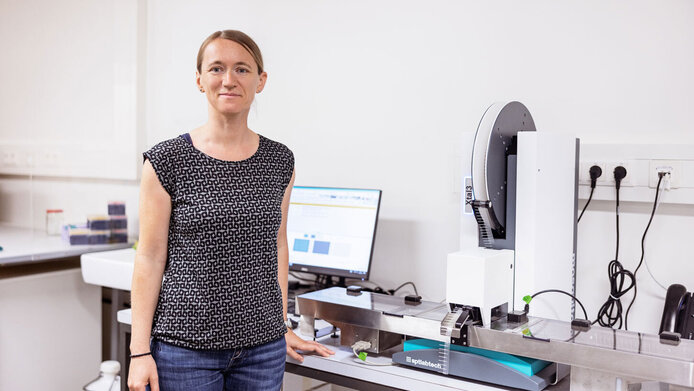A cell protein like a bull in a china shop

You study the protein legumain, which is active in human cells. What makes it an interesting object of research?
Elfriede Dall: Legumain is a protein that is one of the real workhorses in our cells. It cuts foreign antigens, including pathogens, into small pieces so that our immune system can recognise and dispose of them. Legumain performs this task in the so-called endo-lysosome. This organelle is the only place in the cell with an acidic pH; all other areas in the cell environment are pH neutral, but legumain has adapted to this acidic environment. However, it has also been detected in other places in the cells, in areas where it does not belong and ends up being as destructive as a bull in a china shop. That’s because when this happens it correlates with diseases such as Alzheimer’s or various forms of cancer.
What questions is your research designed to answer?
Dall: We have already been able to demonstrate that the legumain can have different degrees of maturity. You can think of these stages as newborns, as children or as adults. However, studies have mostly only focused on the adult form so far, which cannot cope with the pH-neutral environment outside the lysosome. However, we can also assume that the other forms, the newborns and children, also have different pH stabilities. It remains unclear which forms legumain has when it is detected outside the organelle. In addition, we have discovered another function of legumain that has not yet been researched. This protein can not only split foreign antigens, but, when restricted to the environment outside the endo-lysosome, it can also trigger the opposite process, gluing them together. This process is called ligation. The problem is that so far there is no way to observe and study all these interconnected processes where all this is taking place in the cell. The START project is aimed at developing suitable methods to study this.
What is the importance of this research for developing new therapies and drugs?
Dall: Our hypothesis is that ligation is one of the key mechanisms in the development of diseases. Only when we fully understand the underlying connections can we develop drugs that can be used to treat Alzheimer’s or cancer therapies. Experiments in animal models show that we are on the right track. It has been proven that blocking legumain can stop the growth of tumours and positively impact neurological abilities in Alzheimer’s disease.
So what are the first steps in your START project?
Dall: The project will be an enormous challenge that I am already very much looking forward to. I will be interacting extensively with potential cooperation partners. As soon as we have found the right people, we can get started. I already have some names in mind.
What does the START Prize mean for your research activities?
Dall: I can now study my research question within a larger context and am no longer limited to having to select individual and more restricted questions. It is important to really understand the underlying mechanism in detail especially with regard to future drug development. Now we will be able to develop and build on this knowledge.
What motivates you in your day-to-day research?
Dall: The mystery of legumain fascinates me. The results from our laboratory experiments are sometimes very surprising. If necessary, you have to rethink your assumptions, be creative and find a new approach. At the same time, you always have to keep the larger research goal in mind.
Do you have role models who inspire you in your work?
Dall: Hans Brandstetter, the head of my research group at the University of Salzburg, is of course very important for my work. He is committed to ensuring that young researchers can also pursue their own ideas. I also got to know the late molecular biologist and Nobel Prize winner Oliver Smithies, whom I had the pleasure of meeting a few years ago at the Nobel Laureate Conference in Lindau, who has been very inspiring to me. At well over 80 years of age, he still took great pleasure in science and even at that age he was still going to the lab to conduct experiments.
Elfriede Dall completed her PhD in molecular biology at the University of Salzburg in 2013. she has been a Senior Scientist in Hans Brandstetter’s Structural Biology Group at the Department of Biosciences and Medical Biology at the University of Salzburg since 2014. Ms. Dall’s previous FWF project, ongoing since 2018, is already dedicated to legumain research.
About the project
The START project “Functional Studies on Extra-Lysosomal Legumain” investigates the functions of the protein legumain, which breaks down foreign antigens, outside the endo-lysosome, an organelle found in the human cell. Usually, this molecule’s activities are limited to the lysosome; however, if it is found outside the lysosome other mechanisms also emerge that are associated with the occurrence of cancer and Alzheimer’s disease. The aim of this research is to analyse these functions in detail in order to lay the foundation for developing drugs in this field.
The START Prize
The START Programme of the Austrian Science Fund FWF is aimed at outstanding young researchers, giving them the opportunity to plan their research over an extended period and with a high degree of financial security. It is endowed with up to EUR 1.2 million and is one of Austria’s most prestigious and most highly endowed awards alongside the Wittgenstein Award.





